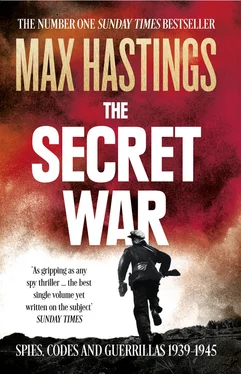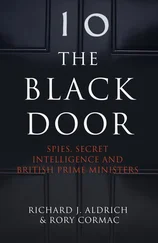In March Soviet intelligence suffered a shock. Moscow considered it an important interest to keep Yugoslavia out of Hitler’s grasp. When it became aware that Prince Paul, the ruling regent, intended to throw in his lot with the Axis, Gen. Solomon Milshtein and a band of GRU ‘illegals’ were dispatched to Belgrade to organise a coup against him. They were confounded when Britain’s SOE pre-empted them, launching its own coup to install King Peter II. Moscow was even more appalled a few days later, when the Wehrmacht swept across Yugoslavia in the face of negligible resistance. Yet even though the Russians sympathised with its people, as fellow-Slavs, Stalin dismissed their pleas for military assistance. He remained stubbornly determined not to be provoked by the British – as he saw it – into an armed struggle against Germany over Yugoslavia. He merely signed a meaningless non-aggression agreement with Belgrade, shortly before German troops swept its new government aside. He had set a course – to buy time before confronting Hitler – and was determined nothing should deflect him from it, least of all the intelligence reports that swamped Moscow Centre between September 1940 and June 1941.
It is hard to assess the contribution of Soviet agents in Switzerland at this time, because modern knowledge is almost entirely dependent on the principals’ later memoirs. All were compulsive liars, bent upon inflating their own roles. Thus, what follows is even more speculative than most accounts of Russian activities. The onset of war had created financial and logistical difficulties for Alexander Radó. There was no Soviet legation in Bern through which cash could be channelled to him, and his cartographic business languished. He was left with little money to fund himself and his family, far less a spy network. Alexander Foote, trained by Ursula Hamburger to serve as Radó’s wireless-operator, was striving with equally meagre funds to sustain a masquerade as a British gentleman of leisure, hoping to sit out the war in the comfort of Lausanne. Wireless assumed a new importance for the network after the fall of France, because Radó could no longer use couriers to shift paper reports via Paris. To provide greater security for the Ring’s communications, he opened a second transmitter operated by a Geneva electrical engineer named Edmond Hamel, who was trained by Foote. Hamel inspired mockery because he was a very small man married to a very large wife, Olga, but he cherished an idealistic enthusiasm for the Soviet Union.
In March 1940, Moscow ordered Anatoli Gourevitch – ‘Monsieur Kent’ – to travel from Brussels to Geneva to hand over a new code to ‘Dora’ – Radó. This was a breach of every rule of espionage, barring contact and thus the risk of contamination between networks, but the GRU man was pleased to be given such an opportunity to spread his wings. As a supposed rich young ‘Uruguayan tourist’, Vincente Sierra commissioned Thomas Cook to make his arrangements, and took a fat book of travellers’ cheques to support his cover. On the train from Paris to Geneva, a man who looked familiar took the seat opposite him. Gourevitch was amazed when his companion introduced himself as Jean Gabin, greatest French film star of the age, on his way to Geneva to see his son make his debut as a circus performer. The two exchanged visiting cards. The enchanted young Russian decided that being a secret agent had many compensations.
Installed in Geneva’s Hôtel Russie, he divided his time between tourism, nightclub visits to support his cover, and a cautious reconnaissance of 113, Rue de Lausanne, the address Centre had given him for Radó. He called the Hungarian’s number from a telephone box, then went to a cinema and left in the middle of the film, to walk to Radó’s house. He was welcomed warmly, but with surprise, according to Gourevitch. The visitor later claimed that he had been bemused by Radó’s ‘careless air’, and by the agent’s claim that, despite the depredations inflicted by war, he still had some money because his map business was not doing badly. Radó introduced his wife Lena, then the two men closeted themselves in his study. Gourevitch handed over a French novel which provided the new key for coding messages. Over the course of the next few hours they practised the routine repeatedly, until both were satisfied that Radó had mastered it. Then they parted, agreeing to meet again in Lausanne, which was conveniently near Montreux, where the ‘Uruguayan tourist’ had booked a stay of several days. Following this second meeting they lunched together in a restaurant, then wandered the streets.
Most Russians abroad suffered severely from homesickness. When Soviet agents met and had leisure enough to gossip, the first question to a man or woman fresh from Moscow was almost always ‘What news from “the village”?’, as they called their country’s capital. Though Radó was Hungarian, according to Gourevitch they talked indiscreetly about each other’s experiences of Centre. Radó allegedly begged his contact to emphasise to Moscow the lofty nature of his sources in Berlin. The Geneva agent also told him the Germans were planning to attack the Soviet Union. Yet it is implausible that in April 1940 Radó should have said Germany was preparing to invade Russia, because at that time Hitler had made no such decision, nor even come near to it. What seems certain, however, is that Centre was rash in sending Gourevitch to Geneva, and that its spies told each other things they should not have done, dangerous to both networks.
At the end of December 1940 Ursula Hamburger left Switzerland for England, where her German communist brother was already living in exile. She was soon followed by her husband Len Brewer. Her set – a ‘musical box’ in their jargon, just as a forger was a ‘cobbler’ and police ‘the doctor’ – was taken to Geneva. Alexander Foote moved back to Lausanne with his own transmitter. It was too dangerous to install an external aerial on his apartment building. Instead, he persuaded a nearby wireless shop to supply the deficiency, saying that he wanted to listen to the BBC. For months, however, he proved unable to raise Moscow. Despite passing countless hours hunched over a Morse key in the kitchen, his urgent pulses vanished into a void. Then on 12 March 1941 came an electrifying moment: into his earphones flickered a response ‘NDA, NDA, OK, QRK5.’ He was in touch with Centre.
Swiss intelligence must have been aware of the Radó group’s transmissions, but at that stage they made no attempt to interfere, even when the Gestapo protested fiercely to Bern about the flood of signals its operators monitored from across the border. The spies now boasted a third transmitter: Radó had met a young woman named Margrit Bolli, daughter of strongly socialistic parents, who said that she was eager to help the communist cause. The Ring trained the twenty-three-year-old girl in Morse technique. Initially she transmitted from the family home in Basle, but when her parents not unreasonably baulked, she moved to Geneva. The Gestapo, listening in frustration to the signals – still unintelligible to them – flooding across the ether from Bolli, Foote and the Hamels christened them ‘ Die Rote Drei ’ – ‘The Red Trio’.
Who was giving Radó the information from Germany which was forwarded to Moscow in an average of five messages a day? The activities of ‘Cissie’, Rachel Dübendorfer, had now been merged into those of his group. Colleagues described her as a charmless woman of Balkan origins. She lived with Paul Böttcher, a former German communist illegally resident in Switzerland: Dübendorfer more than once used her nominal Swiss husband’s identity documents to preserve Böttcher’s neck. It is alleged that one of her sources provided an explicit warning of ‘Barbarossa’. Meanwhile one of Radó’s messages, dated 21 February 1941, quoted a Swiss intelligence officer, Mayr von Baldegg or ‘Luise’, predicting a German invasion at the end of May, a forecast perhaps secured by the Swiss Viking intelligence network inside Germany, and endorsed by a prominent Japanese diplomat. The network also became a conduit through which some Czech intelligence was passed to Moscow, most of it ultimately derived from the Abwehr’s Paul Thummel. At the end of May Radó cited a French diplomat, Louis Suss, predicting an invasion on 22 June – this message provoked an icy response from Moscow. So did another report to the same effect from Rudolf Rössler, who would henceforward become the foremost source for the Radó network. His codename ‘Lucy’ has passed into history, since the GRU’s Swiss operation became familiarly known as the ‘Lucy’ Ring.
Читать дальше












